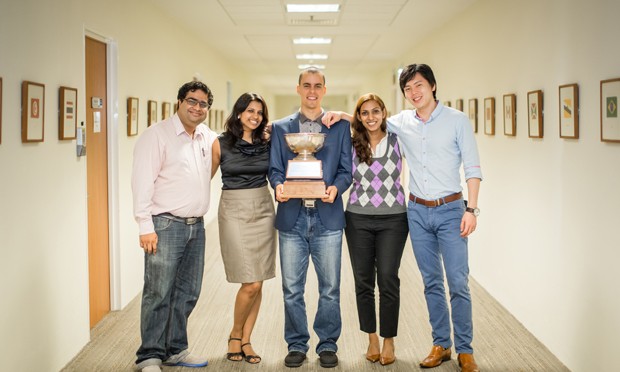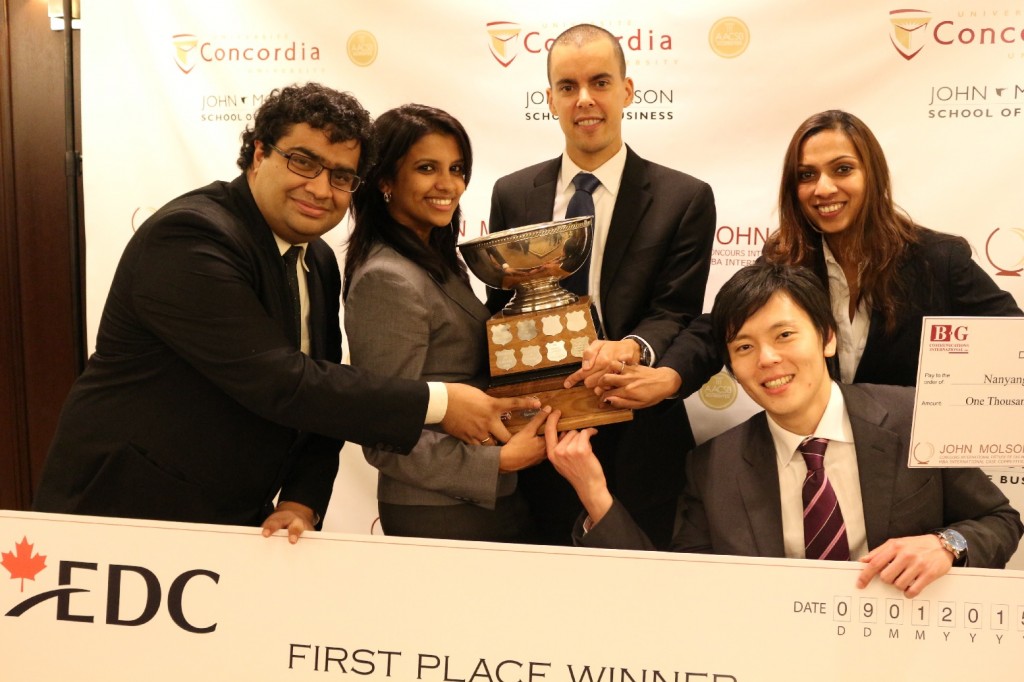Submitted by Cory Reid, Student Exco VP Case Competition
As mentioned in the earlier journal entry on the post-competition celebration, the Nanyang MBA team was victorious at the 2015 John Molson MBA International Case Competition. (News coverage on Channel News Asia, Straits Times, NTU Website).
Not only that, but we remained undefeated throughout the competition. The team consisted of myself, Cory Reid, and Aswathi Suresh, Sunitha Vijiyasingam and Jonah Wong. We were accompanied by our coach, Akshay Regulagedda whom we couldn’t have done without. We also had coaching by past participants and Nanyang MBA alumni Gaurav Goel and Minti Sen. In addition, Prof Vijay Sethi was instrumental in helping select the team and provide feedback after multiple practice sessions.
 (from L to R: Aswathi Suresh, Cory Reid, Jonah Wong, Sunitha Vijiyasingam)
(from L to R: Aswathi Suresh, Cory Reid, Jonah Wong, Sunitha Vijiyasingam)
Before I go into my perspective as a participant, let me expand on the details of the competition. The event was held on 5 to 9 January in Montreal, Canada and consisted of 36 teams of 4 MBA students. There were three rounds in the competition; the first was a round robin format where each team competed 1 on 1 with the other 5 teams. This round included 5 cases: 3 ‘standard’ cases, 1 short case, and 1 live case.
For standard cases, the participants are given 3 hours to read the case, discuss and analyze, prepare slides, and submit for presentation. The presentation itself is a maximum of 25 minutes with 15 minutes of Q&A time from the judges. In the short case, the teams are given only 90 minutes to prepare a presentation of 15 minutes, with 10 minute Q&A. The live case consists of one hour of assigned reading, followed by a one hour presentation by the actual company and one hour of Q&A. After which the teams have 2 hours to discuss, analyze and prepare the slides. The 3 semi-final rounds include 3 teams each. Finally, the top 3 from the semis went to the final round. Both these rounds used the standard case format.
Now for my perspective. All I can really say is what an amazing experience. After about a month of intense practice we had arrived in Montreal. The sheer size of the competition was hard to grasp with over 180 students, 36 coaches and hundreds of volunteers descending on the Fairmont Queen Elizabeth Hotel in the heart of Montreal. We weren’t sure how we would fare; we had been coming together quite well as a team but each practice session seemed to identify multiple areas for improvement.
After one last practice case on Sunday night, we had our first real taste of the competition on Monday morning. The first case was challenging but it seemed like we had just enough practice to put together a decent presentation. The case was on an eyewear manufacturer called Warby Parker and although we felt like we had left some ideas on the table, we still came out on top over Universität Düsseldorf from Germany. At the same time this felt like the turning point; we knew we had to come up with more innovative, more creative and more structured recommendations.
The next case was Tuesday morning on Paris Saint-Germain F.C., a Parisian football club. This is where the team really came together – a combination of our love for football and nascent creativity helped to propel us over the strong team from the University of Ottawa. Tuesday afternoon brought us to the short case; a very peculiar one that asked the team to prioritize a CEO’s schedule based on a list of voicemails he had received. Building on our innovation in the morning, we were able to build a strong slide deck and triumph over the Schulich School of Business from York University.
Wednesday then brought the live case which basically took the entire day. Lufa Farms, from Montreal, Quebec, was the subject of this case and presented a very interesting company. They grow food on rooftop green houses in Montreal and partner with organic farmers to provide organic food throughout Montreal. Although we only had 2 hours for the actual slide creation it really came down to structuring our many ideas into a cohesive presentation. We nearly ran out of time on this one and stumbled slightly in the presentation but managed to overcome the team from The American University in Cairo School of Business. It was especially nerve wracking because one of the executives from Lufa Farms was sitting in on our presentation! This case also made us realize that finishing early was very important so we could collect our thoughts before delivering the presentation.
 (The Nanyang MBA Team with their coach, Akshay Regulagedda)
(The Nanyang MBA Team with their coach, Akshay Regulagedda)
The final case was on Thursday morning against the University of Florida. This time it was Brunet Pharmacies, a company that had been acquired by the large grocer Metro and was struggling to differentiate itself from its competitors. At this point, our quick grasp of the challenges and creative solutions were almost second nature and we put together a solid presentation. Winning this last round put us at the top of our division and gave us 187 points, which tied us for overall point leader with I.H. Asper School of Business from the University of Manitoba.
The semi-finals pitted us against our division rivals Universität Düsseldorf and the Université de Laval who had also been undefeated in their division. Because the competition is bilingual, some schools presented in French. Laval was one such school and since none of us spoke French we really didn’t know what to expect from them. The level of complexity of the semi-final case took us by surprise; it was long, numbers heavy and from a very specific industry: battery manufacturing in India. The company, Xtra Power, had supply chain issues and the case asked the teams whether they should replace their vendors and logistics provider. The team’s initial reaction to the case wasn’t good – it just seemed so difficult. However, we really motivated each other to brainstorm ideas and figure it out while crunching the financial numbers to back up our recommendations. This also had to be one of our best presentations. The flow was superb and our timing impeccable. Even the Q&A, which we had trouble with in the first few cases, was rock solid.
Later that night there was a costume party in one of the ball rooms, but our team was just too exhausted to attend. However, the organizers decided to release the results there and the team arrived just in time. Once they announced us as a finalist, my energy was renewed. It really felt great to not only come together as a team but also succeed at such a competitive event.
After getting a decent amount of rest, Friday brought the last case. This was tough because we knew that the audience would be much larger than any before and that the presentations would be filmed. The two other teams in the final were the Moore School of Business from the University of South Carolina who had finished 3rd in 2014 and the Porto Business School who had won the competition a few years ago.
We knew we had to come out strong with innovative yet practical recommendations for the subject of this case: a Brazilian bus manufacturer named MarcoPolo. With operations around the globe, the company faced tough competition from lower cost Chinese manufacturers. The challenge posed was to determine which emerging and mature markets to enter and how best to do it. Again, the team was firing on all cylinders. Churning out creative ideas, number crunching and structuring the presentation at breakneck speed. I can’t speak for my teammates, but this was my favourite part of the competition. Analyzing the case, pulling it apart, figuring out what we could do and then putting it all back together.
Regardless of the result, I was extremely proud to be part of the team and all in all, the experience was better than anything I could have anticipated. The team grew beyond what I thought was possible and it made for a week I will never forget.
For more information about Nanyang Business School click here.

